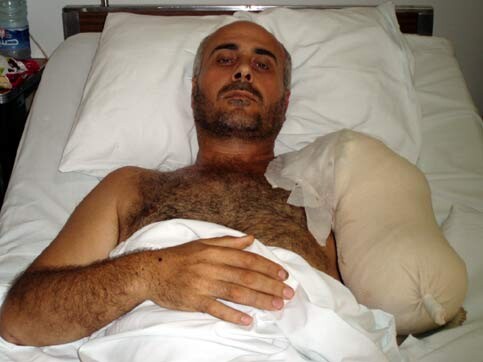IRIN 8 August 2006

Khuder Gazali, ambulance driver hit by Israeli rocket, being treated in a hospital in Sidon (Dahr Jamail)
TYRE - Aid agencies and doctors in south Lebanon say there is a growing shortage of medication for chronic diseases, such as diabetes, cancer and AIDS. Unless Israeli-imposed travel restrictions ease, thousands of people receiving treatment will suffer.
“Many people remain in the villages near the border, who have been taking treatments for years and now suddenly their supply is cut,” said Hakim Khalji, Medecins Sans Frontieres (MSF) coordinator in the port city of Tyre.
MSF is providing medical supplies to people in and around Tyre but is not making deliveries of chronic disease medication to outlying villages because of dangerous conditions created by the conflict.
International agencies have to get permission from Israeli authorities to assure safe passage of their vehicles, but this is often not granted for security reasons.
The current conflict began on 12 July when Hezbollah, a Lebanese political party with an armed wing, captured two Israeli soldiers. Israel imposed an air, land and sea blockade on Lebanon and launched a military offensive that has included the bombing of 600 sections of road, 73 bridges and 72 overpasses, according to the Lebanese Higher Relief Council - a government body set up specifically to manage relief efforts in this conflict.
An Israeli bombardment has cut the road to Tyre, and the military dropped leaflets on south Lebanon on Tuesday, warning it would strike any vehicle travelling south of the Litani River, an area that includes Tyre.
Israel says the ongoing offensive against Lebanese infrastructure is intended to prevent Hezbollah from moving supplies and munitions.
The United Nations Humanitarian Coordinator in Lebanon, David Shearer, on Monday called on the Israeli Defense Forces (IDF) to end its attacks on civilian infrastructure and cease all actions hindering the supply of humanitarian relief to the hundreds of thousands of displaced people across the country.
Shearer said the destruction had pushed Lebanon to the brink of a humanitarian disaster and was threatening to paralyse relief efforts.
Alissar Ardy, National Officer for the World Health Organization (WHO), said the agency had organised delivery of three WHO medical kits to Tyre, including medication for chronic diseases, for up to 10,000 people for three months, but this was far from enough. According to the WHO, chronic diseases accounted for 77 percent of all deaths in Lebanon in 2002.
Five WHO medical kits were also delivered to Sidon, where tens of thousands of IDPs from south Lebanon have sought refuge. Ardy said screening internally displaced people (IDPs) and the local population of Tyre and the port of Sidon was taking time, hampering efforts to provide chronic disease medication to those needing it.
Dr Bashir Sham, director of the Sham hospital in Sidon, said his facility had medication for chronic diseases for three more weeks, but noted that treating heart disease was becoming a major concern as a result of a shortage of medicines.
Aid agencies estimate that up to 25,000 civilians are still in Tyre, with a further 25,000 IDPs and as many as 30,000 people in the 38 villages dotted along Lebanon’s southern border with Israel.
Related Links
This item comes to you via IRIN, a UN humanitarian news and information service, but may not necessarily reflect the views of the United Nations or its agencies. All IRIN material may be reposted or reprinted free-of-charge; refer to the copyright page for conditions of use. IRIN is a project of the UN Office for the Coordination of Humanitarian Affairs.